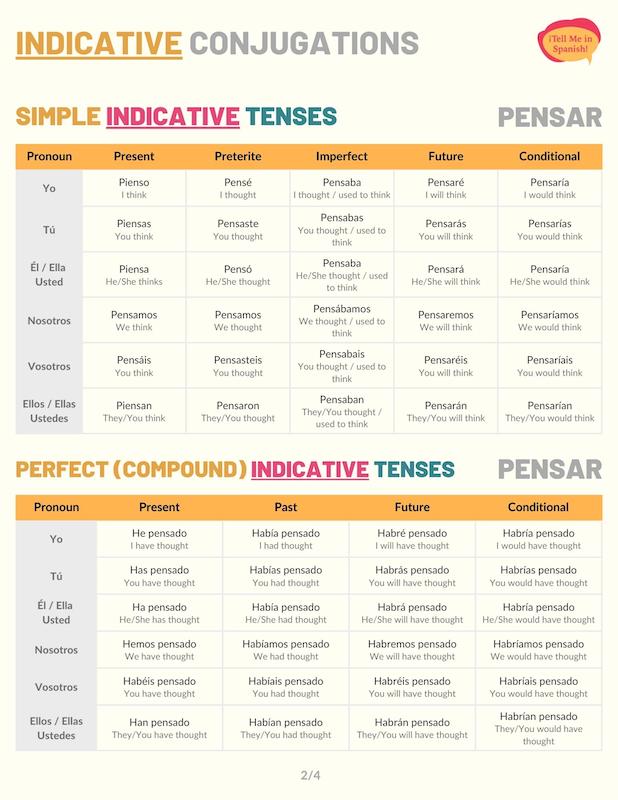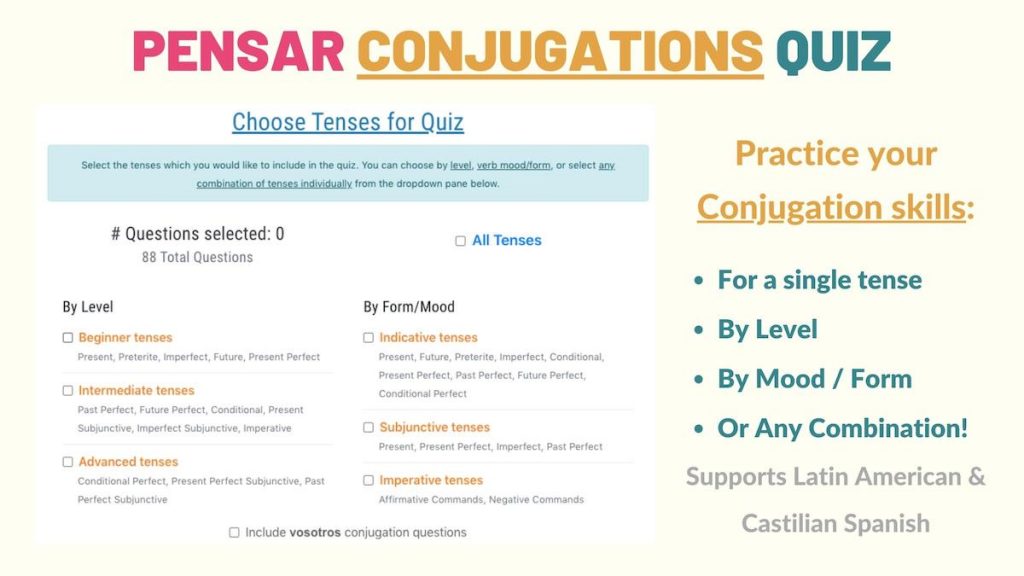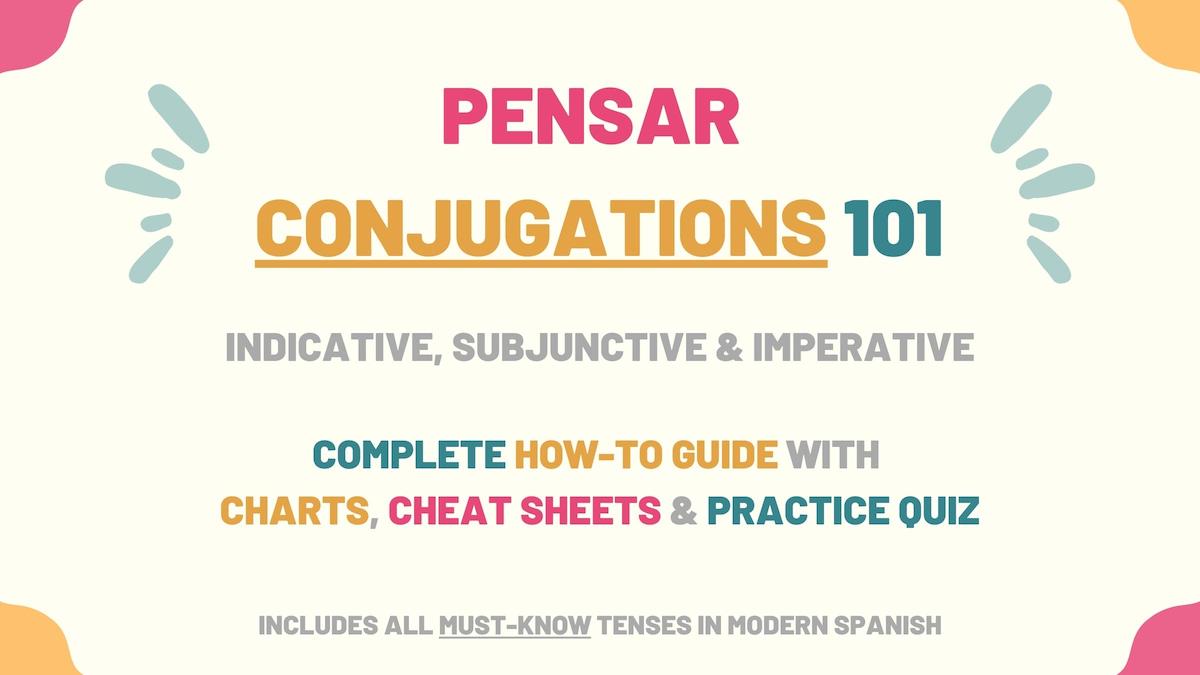Pensar is an -AR verb with an E to IE stem change. Because it’s such a common verb and can also help you practice these patterns, in this guide, we’ll go over the pensar conjugation charts. Here is what you’ll learn:
- Pensar Overview
- Indicative Tenses of Pensar Conjugations
- Subjunctive Tenses of Pensar Conjugations
- Imperative (Commands) of Pensar Conjugations
- Uses & Examples
- Download Pensar Conjugation Tables & Uses Cheat sheets
- Pensar Conjugation Practice Quiz
Overview of Pensar
| Verb Characteristic | Property |
|---|---|
| Verb Type | -AR |
| Irregular | No |
| Infinitive | Pensar |
| Gerund (Present Participle) Form | Pensando |
| Past Participle Form | Pensado |
| Synonyms | Creer, reflexionar, opinar. |
Stem Changes: E to IE
- Present tense: piens for all subject pronouns except ‘nosotros’ and ‘vosotros’.
- Present subjunctive: piens for all subject pronouns except ‘nosotros’ and ‘vosotros’.
- Affirmative imperative: piens for all subject pronouns except ‘vosotros’.
- Negative imperative: piens for all subject pronouns except ‘vosotros’.
In Spanish, pensar means ‘to think’, ‘to believe’, ‘to plan’, among other applications. However, the following conjugation charts only have one translation to keep the tables as clear as possible. You can learn more about the meanings of ‘pensar’ in the section Uses & Meanings.
Indicative Conjugations of Pensar
Present tense
Pensar present tense conjugations have an E to IE stem change for all subjects, except ‘nosotros’ and ‘vosotros’. We use this tense, to provide our current opinion or express what someone thinks. For example: ¿Qué piensan sobre este tema?
| Person | Conjugation | Translation |
|---|---|---|
| Yo | Pienso | I think |
| Tú | Piensas | You think |
| Él / Ella Usted | Piensa | He/She thinks You (formal) think |
| Nosotros | Pensamos | We think |
| Vosotros | Pensáis | You think |
| Ellos / Ellas Ustedes | Piensan | They think You (plural) think |
Preterite tense
Pensar past preterite conjugations refer to what people thought or believed at some point in the past. For example: Pensé que estabas enojada conmigo.
| Person | Conjugation | Translation |
|---|---|---|
| Yo | Pensé | I thought |
| Tú | Pensaste | You thought |
| Él / Ella Usted | Pensó | He/She thought You (formal) thought |
| Nosotros | Pensamos | We thought |
| Vosotros | Pensasteis | You thought |
| Ellos / Ellas Ustedes | Pensaron | They thought You (plural) thought |
Imperfect tense
Pensar imperfect conjugation communicates what people thought or believed for an extended period of time in the past. Siempre pensaba mucho en ella.
| Person | Conjugation | Translation |
|---|---|---|
| Yo | Pensaba | I thought I used to think |
| Tú | Pensabas | You thought You used to think |
| Él / Ella Usted | Pensaba | He/She thought He/She used to think You (formal) thought You (formal) used to think |
| Nosotros | Pensábamos | We thought We used to think |
| Vosotros | Pensabais | You thought You used to think |
| Ellos / Ellas Ustedes | Pensaban | They thought They used to think You (plural) thought You (plural) used to think |
Near future
In Spanish, the immediate future of pensar communicates that someone is about or will think about something at some point in the future. For example: ¿Qué va a pensar mi papá? To conjugate pensar to this future form, use the formula ir + a + infinitive verb (pensar, in this case)
| Person | Conjugation | Translation |
|---|---|---|
| Yo | Voy a pensar | I’m going to think |
| Tú | Vas a pensar | You’re going to think |
| Él / Ella Usted | Va a pensar | He/She is going to think You (formal) are going to think |
| Nosotros | Vamos a pensar | We’re going to think |
| Vosotros | Vais a pensar | You’re going to think |
| Ellos / Ellas Ustedes | Van a pensar | They’re going to think You (plural) are going to think |
Future simple tense
Conjugate pensar to the future simple tense to express that someone will think about someone or something at some point in the future. Ya pensaremos en algo.
| Person | Conjugation | Translation |
|---|---|---|
| Yo | Pensaré | I will think |
| Tú | Pensarás | You will think |
| Él / Ella Usted | Pensará | He/She will think You (formal) will think |
| Nosotros | Pensaremos | We will think |
| Vosotros | Pensaréis | You (formal) will think |
| Ellos / Ellas Ustedes | Pensarán | They will think You (plural) will think |
Conditional tense
When conjugated to the conditional tense, this verb is used to talk about what someone would think. You can use these forms to express conditional sentences or hypothetical situations related to beliefs or thinking.
For instance: ¿Qué pensarías si te dijera que…?
| Person | Conjugation | Translation |
|---|---|---|
| Yo | Pensaría | I would think |
| Tú | Pensarías | You would think |
| Él / Ella Usted | Pensaría | He/She would think You (formal) would think |
| Nosotros | Pensaríamos | We would think |
| Vosotros | Pensaríais | You would think |
| Ellos / Ellas Ustedes | Pensarían | They would think You (plural) would think |
Present perfect tense
The present perfect indicative tense in Spanish is formed with the structure haber in the present tense + pensado (past participle). Use these conjugations of pensar to express that someone has or hasn’t thought about something. For example: ¿Han pensando en lo que les dije?
| Person | Conjugation | Translation |
|---|---|---|
| Yo | He pensado | I have thought |
| Tú | Has pensado | You have thought |
| Él / Ella Usted | Ha pensado | He/She has thought You (formal) have thought |
| Nosotros | Hemos pensado | We have thought |
| Vosotros | Habéis pensado | You have thought |
| Ellos / Ellas Ustedes | Han pensado | They have thought You (plural) have thought |
Past perfect
The past perfect conjugations of pensar are formed with haber (imperfect form) + pensado (past participle form of ‘pensar’). In the past perfect, this verb communicates that someone had or hadn’t thought about something before another past action or time frame.
For example: Nunca había pensado en eso.
| Person | Conjugation | Translation |
|---|---|---|
| Yo | Había pensado | I had thought |
| Tú | Habías pensado | You had thought |
| Él / Ella Usted | Había pensado | He/She had thought You (formal) had thought |
| Nosotros | Habíamos pensado | We had thought |
| Vosotros | Habíais pensado | You had thought |
| Ellos / Ellas Ustedes | Habían pensado | They had thought You (plural) had thought |
Future perfect
When conjugated to the Spanish future perfect tense, pensar expresses that someone will have believed or thought about something by or before a certain moment in the future. These forms also communicate what someone might have thought. ¿Ellie habrá pensando en mí?
| Person | Conjugation | Translation |
|---|---|---|
| Yo | Habré pensado | I will have thought |
| Tú | Habrás pensado | You will have thought |
| Él / Ella Usted | Habrá pensado | He/She will have thought You (formal) will have thought |
| Nosotros | Habremos pensado | We will have thought |
| Vosotros | Habréis pensado | You will have thought |
| Ellos / Ellas Ustedes | Habrán pensado | They will have thought You (plural) will have thought |
Conditional perfect
Pensar conjugated to the Spanish conditional perfect tense is used to say that someone would have thought about something as long as a past condition had been met. For instance: Si no te hubiera dicho, ¿habrías pensado en cambiar tu actitud?
| Person | Conjugation | Translation |
|---|---|---|
| Yo | Habría pensado | I would have thought |
| Tú | Habrías pensado | You would have thought |
| Él / Ella Usted | Habría pensado | He/She would have thought You (formal) would have thought |
| Nosotros | Habríamos pensado | We would have thought |
| Vosotros | Habríais pensado | You would have thought |
| Ellos / Ellas Ustedes | Habrían pensado | They would have thought You (plural) would have thought |
Progressive tenses
Estar conjugated + pensando (present participle form) is the formula we use to conjugate to the present progressive tenses. These conjugations of ‘pensar’ allow you to express that someone is thinking about something at the moment of speaking or when an action takes place.
For instance: A las 8, todavía estábamos pensando cómo arreglar la computadora.
| Progressive Tense | Formula | Translation Example |
|---|---|---|
| Present | Estar (present) + pensando | I am thinking |
| Preterite | Estar (preterite) + pensando | You were thinking |
| Imperfect | Estar (imperfect) + pensando | He was thinking |
| Future | Estar (future) + pensando | We will be thinking |
| Conditional | Estar (conditional) + pensando | They would be thinking |
Pensar Subjunctive Conjugations
The subjunctive mood in Spanish refers to wishes, requests, suggestions, expectations, doubts, or hypothetical situations. In the section below, you’ll find pensar conjugation charts for the key subjunctive tenses.
Present subjunctive
Pensar present subjunctive conjugations also have an E to IE stem change for all subjects except ‘nosotros’ and ‘vosotros’. We use these conjugations to wish or request someone to think or believe something. For example: Quiero que piensen en lo que hicieron.
| Person | Conjugation | Translation |
|---|---|---|
| Yo | Piense | I think |
| Tú | Pienses | You think |
| Él / Ella Usted | Piense | He/She thinks You (formal) think |
| Nosotros | Pensemos | We think |
| Vosotros | Penséis | You think |
| Ellos / Ellas Ustedes | Piensen | They think You (plural) think |
Present perfect subjunctive
Haber in the present subjunctive + pensado is the structure to form the present perfect subjunctive conjugations of ‘pensar’. We use this tense to wish or wonder if a person has already thought about something. Espero que hayas pensando en mí.
| Person | Conjugation | Translation |
|---|---|---|
| Yo | Haya pensado | I have thought |
| Tú | Hayas pensado | You have thought |
| Él / Ella Usted | Haya pensado | He/She has thought You (formal) have thought |
| Nosotros | Hayamos pensado | We have thought |
| Vosotros | Hayáis pensado | You have thought |
| Ellos / Ellas Ustedes | Hayan pensado | They have thought You (plural) have thought |
Imperfect subjunctive
In the Spanish imperfect subjunctive tense, pensar refers to past requests, suggestions, or hopes someone had about a person thinking about something. Les sugerí que pensasen en español.
Depending on the type of Spanish you use, the imperfect subjunctive has two different conjugation models:
Latin American Spanish version
| Person | Conjugation | Translation |
|---|---|---|
| Yo | Pensara | I thought |
| Tú | Pensaras | You thought |
| Él / Ella Usted | Pensara | He/She thought You (formal) thought |
| Nosotros | Pensáramos | We thought |
| Ellos / Ellas Ustedes | Pensaran | They thought You (plural) thought |
Note: In Latin American Spanish, vosotros is not used. As a result, this conjugation chart doesn’t include pensar’s conjugation for this pronoun.
Castilian Spanish version
| Person | Conjugation | Translation |
|---|---|---|
| Yo | Pensase | I thought |
| Tú | Pensases | You thought |
| Él / Ella Usted | Pensase | He/She thought You (formal) thought |
| Nosotros | Pensásemos | We thought |
| Vosotros | Pensaseis | You thought |
| Ellos / Ellas Ustedes | Pensasen | They thought You (plural) thought |
Past perfect subjunctive
The past perfect subjunctive conjugations of pensar communicate that someone would have thought about something if a past action was met. You can also use these forms to express regret or the hypothetical outcomes if someone had thought about something.
For example: Si hubieras pensado un poquito más, no te habrías equivocado.
| Person | Conjugation | Translation |
|---|---|---|
| Yo | Hubiera pensado | I had thought |
| Tú | Hubieras pensado | You had thought |
| Él / Ella Usted | Hubiera pensado | He/She had thought You (formal) had thought |
| Nosotros | Hubiéramos pensado | We had thought |
| Vosotros | Hubierais pensado | You had thought |
| Ellos / Ellas Ustedes | Hubieran pensado | They had thought You (plural) had thought |
Pensar Imperative Conjugations
To order people to do or not do something, we use Spanish commands.
Affirmative commands
Pensar affirmative command conjugations have an E to IE stem change for all subjects except ‘vosotros’. We conjugate this verb to this tense to order someone to think about something or to think in a certain way. For example: Piensa otra vez.
| Person | Conjugation | Translation |
|---|---|---|
| Tú | Piensa | Think |
| Usted | Piense | Think |
| Vosotros | Pensad | Think |
| Ustedes | Piensen | Think |
Negative commands
The negative imperative of ‘pensar’ has an E to IE stem change for all subjects. Use these commands, to instruct people not to think about something. For example: No piensen así, todo va a salir bien.
| Person | Conjugation | Translation |
|---|---|---|
| Tú | No pienses | Don’t think |
| Usted | No piense | Don’t think |
| Vosotros | No penséis | Don’t think |
| Ustedes | No piensen | Don’t think |
Meanings of Pensar & Examples
Since we already saw how to conjugate pensar in Spanish, now we’ll check some structures and examples, so you apply this verb correctly.
- Talking about thinking or believes
[Pensar conjugated] + [complement]
¿Qué piensas sobre la chica nueva?
What do you think about the new girl?
Ben siempre está pensando en su novia.
Ben is always thinking about his girlfriend.
¿Han pensado que tal vez esta no sea la mejor solución?
Have you thought that maybe this is not the best solution?
Take Note: Pensar uses the preposition en when remembering or thinking about something or someone. Use sobre when asking what someone thinks about something. People use the preposition de instead of ‘sobre’ in conversational Spanish.
- Referring to plans or intentions
Depending on the sentences, with this application, pensar means ‘going to’, ‘to plan’, or ‘to mean’.
[Pensar conjugated] + [infinitive verb]
No pienso ir con ustedes.
I am not going with you, guys.
Pensaba llamarte, pero se me hizo tarde.
I was thinking of calling you, but I was late.
Download Pensar Conjugation Tables & Uses Cheat sheets

Pensar is a regular verb, but has some stem changes in several tenses and it can be challenging for Spanish learners to remember its various forms. So, I’ve created a PDF with all the pensar conjugation charts which you can download. It also includes the meanings and uses of pensar along with daily conversation example sentences.
Practice Quiz: Pensar Conjugation

Now that you know how to conjugate Pensar in Spanish, you can test your knowledge of this verbs various forms and tenses with stem changes by taking the pensar conjugation practice quiz.





